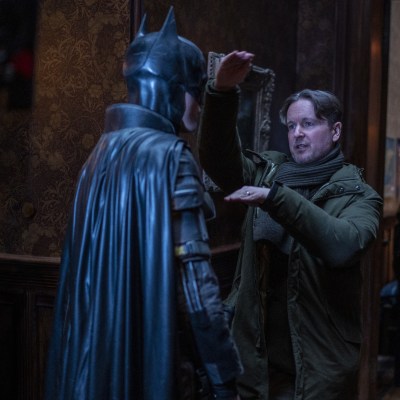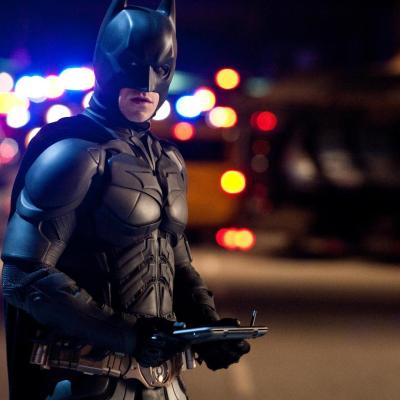The Dark Knight: When Plot Holes Don’t Matter
If you’re still trying to figure out some inconsistencies in The Dark Knight we have an answer: who cares?

Movies have the ability to bend time–not just in a screenplay, but in real life itself. There’s a strange but accepted phenomenon that if a movie is working, it could be three and a half hours long but that time will fly by like a starship buzzing across the cosmos at Warp 7. Conversely, if a film doesn’t come together, it could be 80 minutes long (without credits) and that will feel like an eternity.
We’ve all gone through that, and we’ve also experienced another curious, organic side effect of watching movies: if the film is generally firing on all cylinders, the occasional minor (or even not-so-minor) hole or inconsistency in the plot will kind of just sidle past us, like a late employee slinking past the boss’s office and hoping they don’t notice.
On the other hand, if a movie fails us on some other level, those gaps or errors of logic become even more glaring. At least in our case, we begin to obsess over them to the point that we might get pulled out of the movie completely (and not even give a damn).
Case in point: Christopher Nolan’s The Dark Knight.
An Imperfect Classic
The Dark Knight, released in 2008, remains unquestionably one of the greatest superhero movies of all time, if not the greatest. It elevated the genre to a new level of serious filmmaking, it proved beyond the shadow of a doubt that the source material was not necessarily just meant for children, and it told a compelling, gripping story peopled with fascinating characters and suffused with themes relevant to the real world.
But yet if you have watched the film enough, it’s pretty easy to notice that there are some pretty large holes in the story–those gaps in logic that would easily bring down a lesser film where the other components, like the pacing, the acting, the action sequences, the visuals and so on, were not doing enough to smooth over the problems with the script.
Some of these plot holes can be chalked up to the fact that Christopher Nolan had a cool image in mind and wanted to shoot it, and to hell with logic. We’re thinking in particular of the opening bank heist, in which the Joker (Heath Ledger) has a school bus come crashing through the front entrance of a bank, loads the bus up with cash, shoots the driver, then steers the bus out into Gotham City traffic–conveniently joining a long row of other school buses cruising down the street.
For one, his timing had to be almost supernaturally impeccable to join the line; but on the other hand, how did no one notice a debris-riddled bus pulling out of a wrecked bank? When you reflect on it later, it almost doesn’t make sense, but that heist sequence is so well-done, and that punchline is so slick, that it doesn’t matter unless you think real hard about it.
The Gordon Problem
There are other holes in the story–you can find lists of them all over the web–but the one that always stood out to us upon repeated viewings comes just about halfway through the film. During a public funeral for Gotham City Police Commissioner Gillian Loeb (poisoned by the Joker), the Clown Prince of Crime infiltrates the honor guard and as they fire their guns into the air as part of the service, turns his weapon toward the Gotham mayor up on the dais. The villain fires directly at him.
Lt. Jim Gordon (Gary Oldman) sees this all transpiring a second beforehand and dives in front of the mayor, taking the bullet himself. Just a moment later, we see his officers turn him over and stare at an apparently dead Gordon.
Of course we find out later that this is not true: Gordon faked his death to protect his family (that’s the short explanation he gives later) and ends up driving the SWAT armored vehicle transporting Harvey Dent (Aaron Eckhart), who’s offered himself up as bait to lure out Joker and give Batman (Christian Bale) a chance to capture him. It’s actually Gordon, wearing a protective faceplate while he’s driving so that neither we nor the officer riding shotgun know that it’s him. He then jumps from the truck and draws his gun on the Joker after the latter’s standoff with the Caped Crusader.
This entire sequence of events bothered us the first time we saw The Dark Knight, as much as the rest of the film utterly blew us away. For example, how does Gordon know to step directly in front of the mayor at the precise second to take the bullet? There’s actually a quick earlier shot in which Gordon appears unnerved and confused by a fusillade of gunshots from the buildings above, indicating that he couldn’t tell who was shooting from where.
While we can accept (even though it’s not specifically stated) that Gordon was wearing a bulletproof vest, how exactly does he fake his death? Is there not a single paramedic on the scene who examines him? Does he come up with the idea of faking his demise on the spot and whisper it off-screen to his subordinates so that they whisk him away before an EMT can even take a cursory look at him?
Who else is in on this? Does SWAT command get tipped off so that they don’t worry about it when a masked driver gets behind the wheel of the vehicle transporting the city’s district attorney? Apparently Dent himself is not informed that Gordon is still alive–you think he might get briefed as well, but he’s seemingly as much in the dark as everyone else.
And why does Gordon not get word to his wife and children that he is still alive? Why is it important that they don’t know? In fact, why is it crucial that his death is faked in the first place? Protecting his family doesn’t make much sense–the Joker may go after him, as he has gone after numerous other public officials, but there’s no indication that the clown targets anyone’s family members.
The Dark Knight Still Works
There is so much here that cries out for explanation or clarity, and there are numerous other instances in the film as well where the inconsistencies in the screenplay can leap out at you if you think about it. Why doesn’t Batman go back up to the Wayne penthouse to get Joker after he rescues Rachel (Maggie Gyllenhaal? How does Joker know he’ll be incarcerated in the Major Crimes Unit and how does he manage to get a bomb on every floor of a hospital without anyone noticing? (The novelization by Dennis O’Neil clears up some of these issues up, but not all.) There are a number of these so-called “holes” throughout the film, but the bottom line is this:
None of it matters.
Any way you look at it, The Dark Knight is a great film. It’s masterfully directed, the atmosphere and tone it sets is controlled and consistent from start to finish, and it contains several outstanding action set pieces. Hans Zimmer’s score is powerful, and the cast is impeccable: of course there is Heah Ledger’s force-of-nature Joker, but Bale is haunted and compelling as Bruce Wayne/Batman, and to this day we feel that Aaron Eckhart’s doomed Harvey Dent is an underappreciated and tragic performance.
We also love the central premise of these three men–Batman, Gordon, and Dent–as possibly the last three honest men in Gotham, coming together to stop this inexplicable being known as the Joker and slowly corrupting themselves and their principles to do so.
Because the movie’s overarching narrative and themes work, because so many other elements of the filmmaking click firmly into place, and because the essential truth and coherence of the story that’s being told is so dynamic and universal (not to mention a fantastic representation of perhaps the greatest hero/villain conflict in all of comic book history), the flaws in the plotting of The Dark Knight just don’t land with enough force to distract us from the rest of the movie or dilute its power.
Sure, we can ask questions like we did above, and spend some time thinking about the Gordon problem or the film’s other lapses in logic, but none of that takes away from our sheer enjoyment of the movie. We just watched The Dark Knight again in preparation for this article, for the first time in probably three years or more, and it still kept us riveted from start to finish.
Go try it yourself and see if you have the same experience. We’ll wait right here.
The Dark Knight is streaming now on Netflix.


